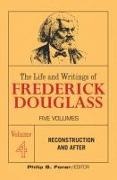Read more
"Reconstruction and After," the fourth volume of the collected works of Frederick Douglass, brings together for the first time his writings and speeches during the crucial period, 1865-1895. These years are also covered in the section of Dr. Foner's full-scale biography of Douglass which appears in this volume.
The present volume brings out Douglass' fight to give meaning to the Union victory in the Civil War by guaranteeing economic, political, and civil freedom to the Negro people. He was an outstanding leader in the campaign for the fourteenth and fifteenth amendments and, when they were ratified, continued to battle to make these laws effective. His writings have a contemporary ring.
About the author
Frederick Douglass was an American social reformer, abolitionist, orator, writer, and statesman who lived from February 1817 or 1818 to February 20, 1895. After escaping slavery in Maryland, he rose to prominence as a national leader of the abolitionist movement in Massachusetts and New York, where he was known for his oratory and incisive antislavery writings. As a result, abolitionists at the time saw him as a living counterexample to enslavers' claims that enslaved persons had the intellectual aptitude to act as independent American citizens. Northerners at the time couldn't believe such a superb orator had been enslaved. Douglass released his initial biography as a reaction to his incredulity. Douglass produced a total of three autobiographies, one of which, The Story of the Life of Frederick Douglass, an American Slave (1845), got a bestseller and was influential in promoting the ideal of abolition, as was his second book, My Bondage and My Freedom (1855). Following the Civil War, Douglass was an outspoken advocate for the rights of freed slaves, and he published his final autobiography, Life and Times of Frederick Douglass.

